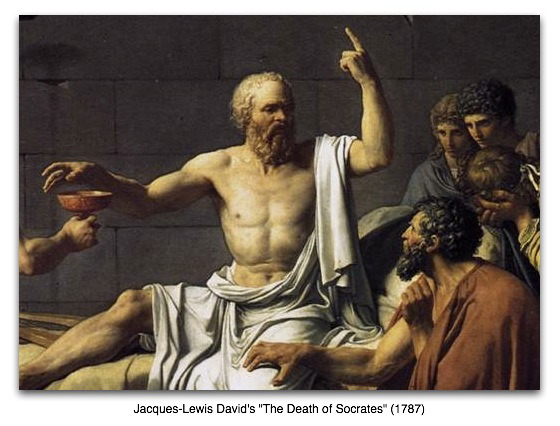State of Being: Whither Western Philosophy?
12/14/2005 00:01 Filed in: Culture Watch

I had a few minutes to kill this afternoon (but upon reflection decided to let them live), so I stopped in to browse the shelves at the Louisville Books-A-Million. I'm still in the process of planning for my upcoming philosophy class, so I decided to look for the philosophy section. The average non-walled bookcase at Books-A-Million has five shelves. I found the philosophy section square in the middle of the religion/inspiration/Bible section of the store, and it took up a total of two of these bookcases, or ten shelves. "Great," I thought, "ten shelves of philosophy books to peruse" (okay, I doubt I actually thought the word, peruse). But then I looked closer.
The ten shelves were divided into three categories: Eastern Philosophy, Western Philosophy, and General Philosophy. Suddenly I realized how the shelves were balanced. Two shelves were devoted to the general category--not sure exactly what kind of nonsense was categorized there. But get this, there were TWO shelves of Western Philosophy and SIX SHELVES OF EASTERN PHILOSOPHY! Think about this for a minute, in an American bookstore, there was more space--three times more space--devoted to Eastern Philosophy than Western Philosophy.
Now granted, Books-A-Million is not the store that's going to set the standard for philosophy inventories. But this kind of odd balance of philosophical thought in a store in Louisville, Kentucky, which has one foot in the South and one foot in the Midwest, speaks loudly to the state of philosophy in our culture. In a society where morals have become more and more relativistic and there is less tolerance for absolutes, does Eastern thought now have more appeal, more persuasion, more influence?
Well, maybe. But then I looked a bit closer. The two shelves devoted to Western Philosophy had the normal stuff you'd expect: Penguin Classic editions of the standards, ranging from Plato to Nietzsche. Various surveys of Western Philosophy and more current interpretations were represented as well. Over to the Eastern Philosophy shelves--what was represented there? The writings of K'ung fu-tze (Confucius); this or that Dummies book on Buddhism, Taoism, and Hinduism; Sun Tzu's Art of War (actually, I found Art of War in the Western Philosophy section, too; all of it was a mess, but I got over my urge to straighten up store bookshelves years ago).
I figured it out. If there's overlap between philosophy and religion in the West, it's even more so in the East. And in many cases, the two are synonymous. What Books-A-Million called Eastern Philosophy was everything from Eastern thought to Eastern religion, all compacted into six shelves. Glancing around, there were cases and cases of books related to Christianity and Judaism, although most of it is popular stuff that I probably wouldn't ever read. And I couldn't imagine trying to pick out a Bible by myself at a store like this if I didn't know anything about the Bible (I counted six walled bookcases of Bibles).
In light of all this, I suppose the balance wasn't as off as I initially thought. However, perhaps the labels could be fine tuned a bit more. And the Western Philosophy section needed to be straightened up and restocked.
Fortunately, I guess Western Philosophy isn't gone from the culture yet. But don't go by the standards set at your local book mega-store.









